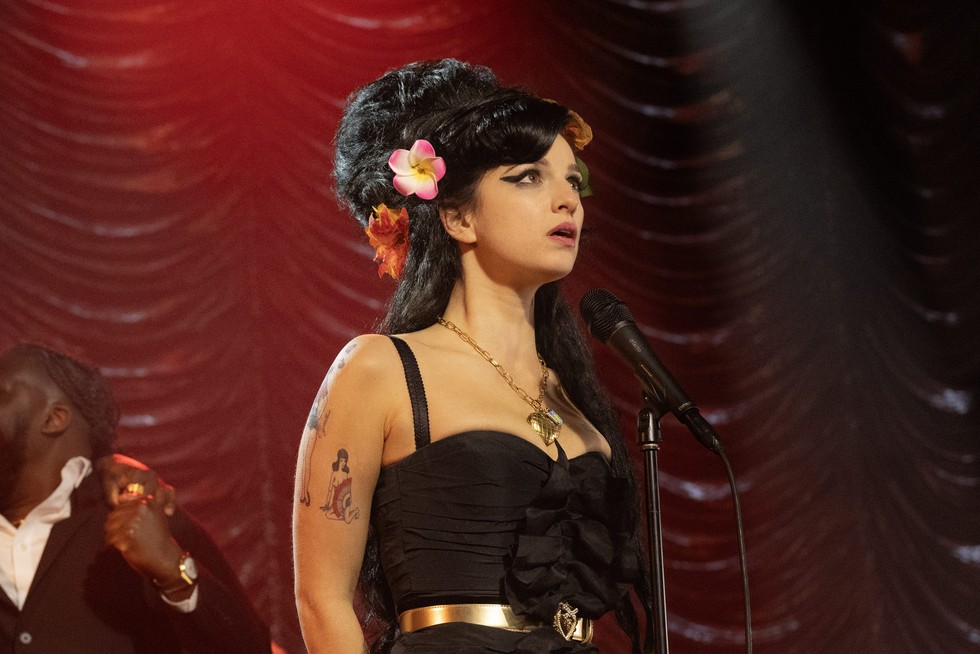
A simplified anti-drug PSA that can’t quite capture its stars essence.
When I heard an Amy Winehouse biopic was landing on the big screen, I didn’t have so much faith. We already have the Amy documentary – a very intimate, honest telling of her story, enthralling and hard to watch at the same time. With close footage of her rise to stardom, coverage on her home life and family, chronological accounts of her struggles with fame and addiction, and footage that really captured her passionate yet offhand character, it didn’t really leave any stone unturned.
So, upon seeing the preview of this film, with Amy looking up into the distance under the spotlight with an orchestral blockbuster-traileriffic version of “Back to Black”, I wasn’t super confident. Will her story fit with a “reach for the stars” retelling? Would she have even wanted that? Or would she cringe a little at the theatrics?
We see it from her starting point as a pub-going bedroom musician, singing at her nan’s house and bouncing around Camden with her mates. After a couple of gigs and quick meetings, it switches gears and skyrockets her to success quite hastily. One minute she’s performing at a London pub, the next inking a deal with Island, recording in Miami and bantering on a TV couch with Jonathan Ross. The speed jump to fame and lowkey concerts don’t give much insight into the magnitude of her following and acclaim. But maybe the dingy bar settings in the first half are an aesthetic choice geared towards Amy’s musicality and down to earth nature – she was jazz-influenced, smokey rooms and anti-pop, rather than red carpet glitz, glamour and manufacturing.
The pain points in this film are done well – parasitic paparazzi pressure is captured faithfully, scenes of her being chased down, hounded and taunted make for uneasy viewing of how she was treated. Seeing her progressively look skinnier and exhausted is a sad glimpse of how addiction slowly kills. But even so, they don’t really delve far into the “why”. Her struggle with bulimia is visited quickly in a first half scene, and her mental health isn’t so much acknowledged (although her possible conditions were more speculated after her death), and then that last reductive scene, a suggestion that the cause of her relapse and death was total heartbreak, when her reality and state of mind was probably far more complex.
Marisa Abela does pretty good as Amy. The singing, while a little too processed and polished, is pitch perfect. She does a decent impression of her confident swagger, and the more sentimental side we didn’t get to see as much. Her chemistry with the other characters is great – there’s a light spark in the first meeting between Amy and Blake, and the close, caring scenes between her and her aunt are full of loving emotion.
But the script can never quite recreate Winehouse’s cool charisma. Her off-the-cuff remarks, her not-really-giving-a-fuck attitude. An opening line where she confidently proclaims “I ain’t no Spice Girl” to her future management sounds shunted in like a monologue in a school play telling us how badass this lead character is, rather than a natural quip in-between puffs of a cigarette.
Jack O’Connell does a good job as Amy’s boyfriend Blake, simultaneously charming yet troublesome, and Eddie Marsen succeeds at playing her perpetually concerned father Mitch. But again, after watching the doc, where both these characters capitalized off Amy’s fame and troubles, it does leave you wondering how they come off so easy here?
This is kind of the problem. This film only scratches the surface, and leaves us with a glossed over, revised edition of her biography. In some ways, maybe that’s a rendition she deserves when years after her death have been focused on the depths of her tragedy, and her time alive having every unflattering angle posted in the tabloids. But when we’ve already seen the whole truth, it feels like we’ve come up a little short with the censored version.
RATING: 5/10
